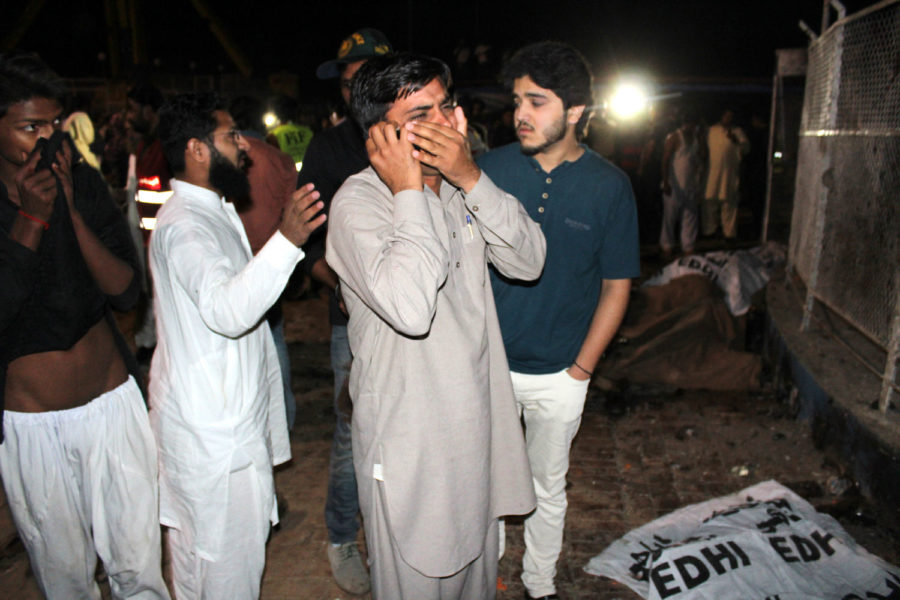Lahore bombing: Pakistan mourns as death toll rises
March 28, 2016
Families of the victims killed in a massive suicide bombing targeting Pakistani Christians in Lahore have started burying their relatives as a nationwide three-day mourning period began.
The funerals on Monday followed the attack at a park in Pakistan’s second-largest city a day earlier, aimed at killing members of the Christian minority gathered on Easter Sunday.
At least 70 people were killed, with many having succumbed to their wounds on Monday. Hundreds were also wounded, officials said. Most victims were women and children.
Advertisement
The bombing was claimed by a breakaway Taliban faction, Jamaat-ul-Ahrar, that has before publicly supported the Islamic State of Iraq and the Levant (ISIL, also known as ISIS) group.
Even though Sunday’s bombing targeted mainly Christians, most of those killed in Lahore were Muslims, who were also in the park on Easter Sunday.
Of the dead, at least 14 have been identified as Christians, according to Lahore Police Superintendent Mohammed Iqbal. Another 12 bodies have not yet been identified, he said.
In response, Pakistan says it will launch a special paramilitary crackdown in Punjab, the country’s most richest and populous province.
The offensive would give paramilitary Rangers extraordinary powers to conduct raids and interrogate suspects similar to those the Rangers have used for more than two years in the southern city of Karachi, a senior security official based in Lahore told the Reuters news agency, on the condition of anonymity.
The suicide bomber detonated himself just meters away from children’s rides in the Gulshan-i-Iqbal park, or Garden of Iqbal, of Allama Iqbal Town. The park is named after Sir Muhammed Iqbal, a prominent Pakistani poet and philosopher who died in Lahore in 1938.
Sahil Pervez, 11, was among those killed.
Advertisement*
His uncle Aftab Gil, speaking at the child’s funeral, said: “The government of Punjab had no security arrangements for the parks or even today here in this church.
“If they deploy some security they are so lazy, so now this is our request from our government and especially from the prime minister, who he should take personal interest to finish this terrorism in this country.”
The bombing marked Pakistan’s deadliest attack since the December 2014 massacre of more than 130 school children at a military-run academy in the city of Peshawar that prompted a big government crackdown on hardline groups.
Sunday’s blast underscored both the precarious position of Pakistan’s minorities and the fact that the fighters from armed groups are still capable of staging wide-scale assaults despite the months-long military offensive targeting their hideouts and safe havens in remote tribal areas.
Ahsanullah Ahsan, a spokesman for Jamaat-ul-Ahrar told the Associated Press news agency late Sunday that the suicide bomber deliberately targeted the Christian community celebrating Easter.
Ahsan said the attack also meant as a protest against Pakistan’s military operation in the tribal regions.
The same group – which has vowed to continue such attacks – also took responsibility for the twin bombings of a Christian Church in Lahore last year.
Jamaat-ul-Ahrar split with the main Pakistani Taliban in 2014. It later declared allegiance to ISIL but has since said it was rejoining the Taliban campaign.
On Monday, authorities said they would launch a manhunt for those behind the attack.
“We must bring the killers of our innocent brothers, sisters and children to justice and will never allow these savage inhumans to over-run our life and liberty,” military spokesman Asim Bajwa said on Twitter.
“Number of suspect terrorists and facilitators arrested and huge cache of arms and ammunition recovered,” he continued, without giving further details.
Meanwhile, Prime Minister Nawaz Sharif toured hospitals full of victims, promising to bring justice.
Witnesses described the scene on Sunday evening as traumatising.
TV footage showed children and women standing in pools of blood outside the park, crying and screaming as rescue workers, officials, police and bystanders carried wounded people to ambulances and private cars.
Local media reported that many of the bodies were being kept in hospital following the attack wards as morgues had become overcrowded.
“I was a few blocks away from the blast,” witness Mian Ashraf told Al Jazeera. “Many people were running and screaming like the world has collapsed. Until when will we see our loved ones getting killed in such attacks?”
Other witnesses said they saw body parts strewn across the ground once the dust had settled after the blast.
“When the blast occurred, the flames were so high they reached above the trees and I saw bodies flying in the air,” said Hasan Imran, 30, a resident who had gone to the park for a walk.
Lahore is the capital of Punjab, which has normally been more peaceful than other parts of Pakistan.
Soon after Sunday’s attack, the Punjab government ordered all public parks closed. The main shopping areas in Lahore were closed and many of the city’s roads were deserted.
___
(c)2016 Al Jazeera (Doha, Qatar)
Visit Al Jazeera (Doha, Qatar) at www.aljazeera.com
Distributed by Tribune Content Agency, LLC.
Advertisement









